Readercon 21: Friday, July 9th, 2010.
Posted in Conventions, Readercon on July 10th, 2010We drove up from Maryland to Burlington, MA yesterday. We got a late start and didn’t arrive until 10:30 p.m., so we missed the Thursday night programming. On Thursday’s Readercon has an evening program schedule that is open to the public. It’s a way for people to see what a convention is like in order to determine if they want to come back for the rest of the weekend and buy a membership.
Being exhausted we just checked in, set up the computers and tried to get to sleep. Unfortunately, my laptop decided it didn’t want to work either — guess it was a rough trip in the back of the car. After a few searches on the program that was causing the problem, we found a fix and downloaded it to Hyperion’s machine and then installed on mine. So, I’m now back to limping along with only the usual problems until the new laptop arrives later this month.
Friday:
We manged in spite of the late night to get up, find food, get to Registration to get our badges, and begin to set up the SFRevu table in the Dealer’s Room. We were surprised at how much easier it was to get set up when we had from 9 a.m. to 3 p.m. to set up. Of course, we also had to figure out how to work around the things that we forgot — like our signs. Luckily, the hotel has a business center with a printer. Once we finished the setup, I’d missed all the morning program items that I’d hoped to see but that’s life and decision making — you have to miss something to do others.

2 p.m. I Don’t Think We’ve Ever Been in Kansas: Non-Western Cultures in Fantasy.
Panelists: Nalo Hopkinson, Shariann Lewitt, Theodora Goss (Leader), Catherynne M. Valente, and Darrell Schweitzer.
Panel Description: When it comes to settings, authors of both epic and urban fantasy— as attested by such recent novels as Daniel Fox’s Dragon in Chains, Ekaterina Sedia’s The Secret History of Moscow, and Nnedi Okorafor’s Who Fears Death—are increasingly diversifying beyond the mainstay models of North America or western Europe. For some writers and readers, the choice of geographies offers a chance to stretch beyond their comfort zones; for others, it can be an exploration and a reclamation of their heritage. How do these different approaches affect the fiction they create—and how do they affect our readings of the books?
Panelists discussed ways to write a story using a culture not your own: respect it, talk to people who are native to that culture, read books written by people native to the culture, don’t exotic-ise it, look at the jokes and sayings of the culture, understand your assumptions and examine them closely to see if they are actually true.
Schweitzer suggest that if you offer details make sure they are right.
There was a lot of discussion on using other people’s culture and stories. The analogy that was decided upon was that telling another culture’s stories was like renting or leasing it — you have to return the story in the same condition that you got it. You can’t trash it or abuse it because it isn’t yours.
Also, remember, no matter what you do as a writer, people will get angry with you so you have to do what you feel is right for you and the story and the culture. People will get angry no matter what so be true to yourself and your internal moral compass.
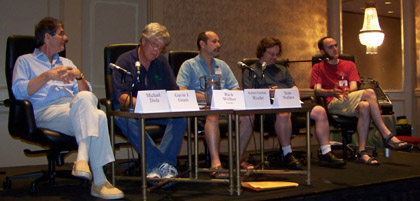
3 p.m. The Best of the Small Press.
Panelists: Michael Dirda, Rick Wilber (leader), Robert Freeman Wexler, Sean Wallace, and Gavin J. Grant.
Panel Description: These days, many of the best novels and novellas, collections and anthologies are published by small presses in print runs that may only number in the hundreds. Most of these cannot be found on the shelves of chain bookstores, or even most independent and specialty shops. We’ll highlight the best works recently published by small presses—including many that Readercon attendees may not have heard about.
The panelists agreed that small presses or independent presses are where some of the best and most cutting edge writing is being published.
There was some discussion of unit prices and how they varied by the size of the print run, problems with distribution, pricing, and the effect of ebooks and whether small presses did ebooks (they do).
Books of note: Shambling Towards Hiroshima by James Morrow, Tachyon Publications; 1st edition (February 1, 2009); The Babylonian Trilogy by Sebastien Doubinski, PS Publishing; Limited and signed ed edition (May 1, 2009); The World More Full of Weeping by Robert J. Wiersema and Erik Mohr, ChiZine Publications; 1st edition (September 15, 2009); anything by Ashtree Publishing; The Third Bear by Jeff VanderMeer, Tachyon Publications (July 15, 2010); Small Beer Press; PS Publishing; Aqueduct Press; Fairway Press; and other book titles, authors, and publishers that I was too far behind in writing to catch.
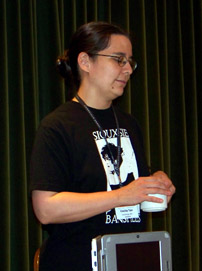 4 p.m. How Electrons Have Changed Writing and Reading. Cecilia Tan (speaker, this was a talk/discussion).
4 p.m. How Electrons Have Changed Writing and Reading. Cecilia Tan (speaker, this was a talk/discussion).
Discussants: Inanna Arthen, Leah Bobet, K. Tempest Bradford, Jeffrey A. Carver, Barbara Krasnoff, K.A. Laity.
Description: Ebooks, the Internet, social media networks, Paypal — have these really changed the writer/reader relationship forever? Not surprisingly, sf readers are early adopters of new tech and sf publishers are leading the way in new content delivery. Is it really possible with new tech for a writer to cut out the publisher and still make a living? Is the writer who wants to “just write” doomed to obscurity now? Writers, what forays into the new frontier of electronic publishing have you made and what did you find out there in the wild lands? Readers, what have you enjoyed and sought out, what would you welcome?
The talk went over the changes over the last few years in publishing and eReader technology and Amazon’s Kindle and B&N’s nook among others. A writer who has the eRights to their books and who puts it in Kindle format on Amazon can get 70% of the book price if priced between 2.99 and 9.99. They mentioned that some authors are making money on their back list that is out of print by putting up the ebooks on various sites.
There was also some discussion of social media and other options such as subscription stories and serialization on blogs. Things are changing. This also puts more of the selling and PR work on the author and some are better at it than others.
Cecilia Tan will have a more coverage of this on her website.
Next I took a break to print up my note cards for my 6 p.m. panel.

6 p.m. Global Warming and Science Fiction.
Panelists: Steven Popkes, Paul Di Filippo, Gayle Surrette (moderator), Alexander Jablokov, and Paolo Bacigalupi.
Panel Description: The dangers of nuclear weapons and nuclear war were common themes in mid-twentieth century sf, even before Hiroshima and Nagasaki. The nearest comparable danger today is anthropogenic global warming. It’s our impression that sf has not given to AGW the same level of attention that it gave to nuclear matters in the past, and has more often treated the issue as worldbuilding background than placed it at the centers of stories. Are we correct? Might this stem from today’s attention to extrapolation of multiple, simultaneous trends, and to the difficulty of writing about the near future? Does AGW’s more uncertain set of consequences make it harder to dramatize? What role does the controversy about the existence of a threat play? What approaches have gone yet untried? We consider sf’s take on a warming world.
Since this was the panel I moderated, I can’t really say much about it, except that I thought the panelists made some very interesting and thought provoking comments. Some that I remember:
That GW isn’t like nuclear war. We didn’t then have the bombs in our houses. We do have cars, lawn mowers, and other devices that put out carbon and cause greenhouse gasses.
The problem is that we’re all idiots and who wants to write that? — it’s not very satisfying. In most of the past problems, it wasn’t our fault. We could blame someone else, but now it’s us.
The story can be about GW if it’s in the background but it’s not a single item — it effects the economy, food production, transportation, the ecology, everything and those impacts need to show in the characters lives. (very paraphrased).
No matter what happens with GW there will be winners and losers. It may change the balance of who has power.
Once the panel was over we went to find food and then talked with friends and just called it a day. Tomorrow is another full day of programming items and the Dealer’s Room wall also be open all day.
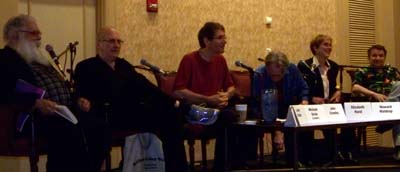
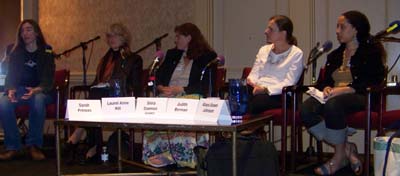
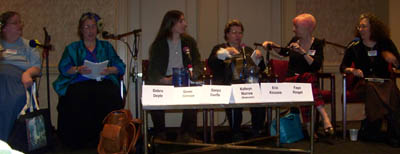

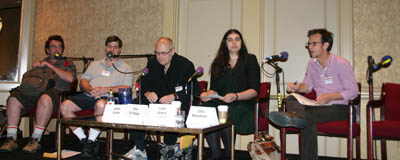
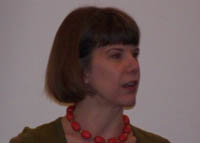 1:00 Narrative Psychology and Science Fiction. Robin Abrahams with discussion by Ellen Asher, Eric M. Van, David Swanger. Talk/Discussion (60 min.). If a character gets shot, it’s a mystery story. If a character gets shot with a phaser, it’s science fiction. But are there elements to science fiction that go deeper than the surface tropes? Psychologist and writer Robin Abrahams discusses what cognitive psychology and her own research about mental models of literary genres–including science fiction, fantasy, and horror–and what personality factors correlate with a liking of different kinds of stories.
1:00 Narrative Psychology and Science Fiction. Robin Abrahams with discussion by Ellen Asher, Eric M. Van, David Swanger. Talk/Discussion (60 min.). If a character gets shot, it’s a mystery story. If a character gets shot with a phaser, it’s science fiction. But are there elements to science fiction that go deeper than the surface tropes? Psychologist and writer Robin Abrahams discusses what cognitive psychology and her own research about mental models of literary genres–including science fiction, fantasy, and horror–and what personality factors correlate with a liking of different kinds of stories. While the talk was interesting, it was wholly theoretical. There is no evidence to support the existence of preons, and there may never be any. What makes the preon theory attractive is both its simplicity, and the ability to explain much (if not all) of the Standard Model and Quantum Mechanics as an emergent behavior of these simple entities. Van’s model is based on what’s gone before, but is modified to fit his own understandings. Given that, the preon model is basically that there is only one basic entity in the universe, the preon and it’s anti-particle, which is just the preon with a negative spin. Things get a little strange at this point as preons live their lives in p-space, a structure which contains two spacial dimensions, one time dimension, and a special non-time, non-space dimension called “qwa”. And it’s in this Qwa dimension the the preons do their spinning. According to the theory, preons are only happy in even number pairs, although the pair may contain any combination of preons and anti-preons. Since each preon has a charge of either +1/6 or -1/6, combining six preons (or anti-preons) gives you all the standard particles in the Hadron family. Other combinations of two or four preons gives you other “normal” particles. The rest of the zoo is, presumably, made up of other combinations. What makes the preon theory predictably nice is that there are multiple ways that two groups of three preons and be bound together. And those methods then determine the masses of the resulting particles, such as the Electron, Muon, and Tauon particles. There was a good deal more, but I think that pretty much gives the flavor of the theory. One last bit, Van assumes that gravity is an emergent property of p-space, and therefore predicts that when the LHC is finally brought on line, they will NOT find the Higgs Boson. Well, we shall see.
While the talk was interesting, it was wholly theoretical. There is no evidence to support the existence of preons, and there may never be any. What makes the preon theory attractive is both its simplicity, and the ability to explain much (if not all) of the Standard Model and Quantum Mechanics as an emergent behavior of these simple entities. Van’s model is based on what’s gone before, but is modified to fit his own understandings. Given that, the preon model is basically that there is only one basic entity in the universe, the preon and it’s anti-particle, which is just the preon with a negative spin. Things get a little strange at this point as preons live their lives in p-space, a structure which contains two spacial dimensions, one time dimension, and a special non-time, non-space dimension called “qwa”. And it’s in this Qwa dimension the the preons do their spinning. According to the theory, preons are only happy in even number pairs, although the pair may contain any combination of preons and anti-preons. Since each preon has a charge of either +1/6 or -1/6, combining six preons (or anti-preons) gives you all the standard particles in the Hadron family. Other combinations of two or four preons gives you other “normal” particles. The rest of the zoo is, presumably, made up of other combinations. What makes the preon theory predictably nice is that there are multiple ways that two groups of three preons and be bound together. And those methods then determine the masses of the resulting particles, such as the Electron, Muon, and Tauon particles. There was a good deal more, but I think that pretty much gives the flavor of the theory. One last bit, Van assumes that gravity is an emergent property of p-space, and therefore predicts that when the LHC is finally brought on line, they will NOT find the Higgs Boson. Well, we shall see.

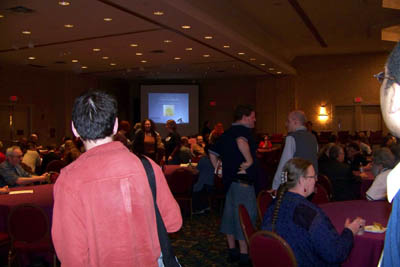
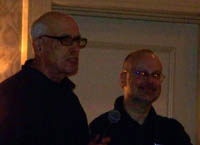
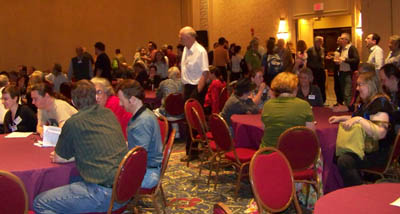
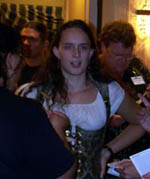
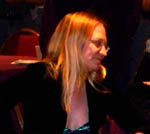
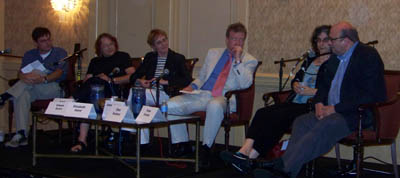 9:00 The Origin of Character in the Breakthrough of the Bicameral Mind. Panelists: Daryl Gregory, Eileen Gunn, Elizabeth Hand, James Patrick Kelly (leader), Ellen Kushner, Peter Straub. Our panelists all report the experience of their characters “taking over” the story and behaving in some way autonomously. But we wonder whether this is actually multiple different psychological phenomena rather than a single one that everyone shares. So, we’ve asked them to compare notes.
9:00 The Origin of Character in the Breakthrough of the Bicameral Mind. Panelists: Daryl Gregory, Eileen Gunn, Elizabeth Hand, James Patrick Kelly (leader), Ellen Kushner, Peter Straub. Our panelists all report the experience of their characters “taking over” the story and behaving in some way autonomously. But we wonder whether this is actually multiple different psychological phenomena rather than a single one that everyone shares. So, we’ve asked them to compare notes. If you’re a Starbucks habitue then you’ve probably seen this cup. It’s surprising how many of their cups I seem drawn to for their color, functionality, and design. This one just screamed the blistering heat of July in Maryland. It’s the gradations of the warm/hot colors in the stylized grid for me it speaks of lazy days sitting on the porch with a good book and a drink — usually iced coffee or tea. Well, at least this cup is large enough for an iced beverage but it’s also a great hefty coffee cup.
If you’re a Starbucks habitue then you’ve probably seen this cup. It’s surprising how many of their cups I seem drawn to for their color, functionality, and design. This one just screamed the blistering heat of July in Maryland. It’s the gradations of the warm/hot colors in the stylized grid for me it speaks of lazy days sitting on the porch with a good book and a drink — usually iced coffee or tea. Well, at least this cup is large enough for an iced beverage but it’s also a great hefty coffee cup. 
